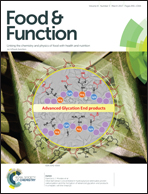Protective effect of isoliquiritin against corticosterone-induced neurotoxicity in PC12 cells
Abstract
Isoliquiritin, a flavonoid glycoside compound from licorice, possesses a broad spectrum of pharmacological activities including antioxidant, anti-inflammatory and anti-depression activities. However, the neuroprotective mechanisms of antidepressant effects remain unclear. In this study, the aim was to investigate the cytoprotective efficiency and potential mechanisms of isoliquiritin in corticosterone-damaged PC12 cells. The results of this study showed that pretreatment of PC12 cells with isoliquiritin significantly prevented corticosterone-induced cell apoptosis. In addition, isoliquiritin increased the activity of dismutase (SOD) and catalase (CAT), decreased the contents of reactive oxygen species (ROS) and malondialdehyde (MDA). These findings suggest that isoliquiritin provides protective action against corticosterone-induced cell damage by reducing oxidative stress. Furthermore, pretreatment with isoliquiritin reduced corticosterone-induced mitochondrial dysfunction by preventing mitochondrial membrane potential dissipation. Our findings indicate that isoliquiritin might exert its therapeutic effects via regulating mitochondrial dysfunction. Moreover, isoliquiritin strongly attenuated intracellular calcium ([Ca2+]i) overload and down-regulation of Bax, caspase-3 and cytochrome C (Cyt-C) protein expression, and up-regulation of Bcl protein expression. In conclusion, isoliquiritin has a cytoprotective effect on corticosterone-induced neurotoxicity in PC12 cells, which may be related to its antioxidant action, inhibition of [Ca2+]i overload and inhibition of the mitochondrial apoptotic pathway.



 Please wait while we load your content...
Please wait while we load your content...